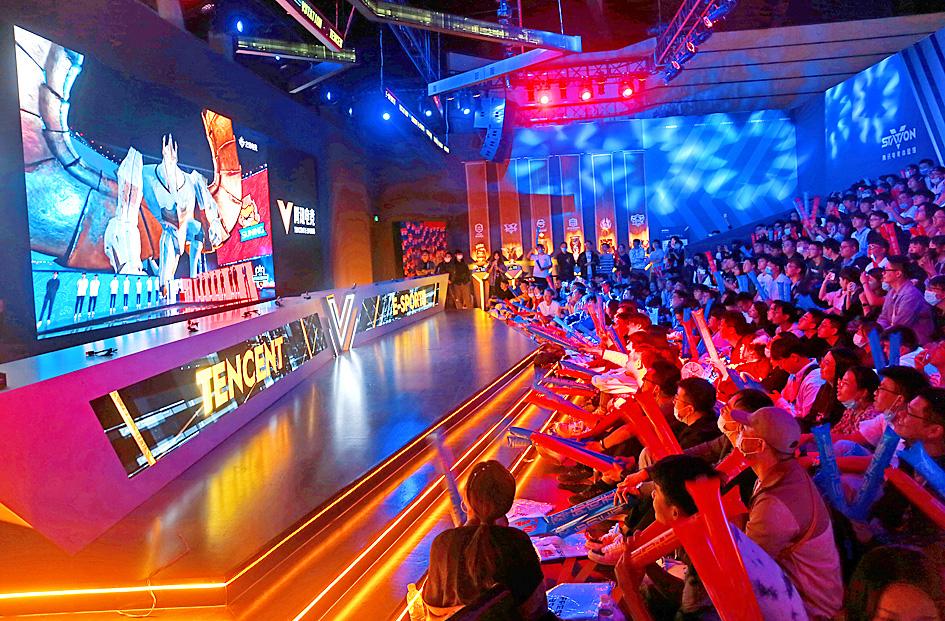Chinese regulators are reviewing new games to determine whether they meet stricter criteria on content and protections for children, people familiar with the matter said, an effort that is likely to slow rollouts in the world’s largest mobile arena.
China’s National Press and Publication Administration is reassessing titles submitted for approval by developers from Tencent Holdings Ltd (騰訊) to NetEase Inc (網易) to ensure they comply with fresh curbs on playing time and other anti-addiction safeguards unveiled last month, the people said.
The watchdog turned back applications late last month and asked developers to resubmit titles with the new mandatory measures built in, they said.

Photo: AP
The review is stoking nerves across an industry already dealing with heightened uncertainty, as Beijing pursues a campaign to rein in unruly Internet spheres, curb gaming addiction and nudge its youth toward more productive pastimes.
On Aug. 30, regulators unveiled rules that went into effect this month to limit play time for minors to just three hours a week, and banned companies from providing services to users without real-name registration. Beijing is also zeroing in on “money worship” and unsavory content such as “effeminacy.”
The strictures can be very specific: Regulators are cracking down on increasingly popular zombie-themed games because they’re “too scary” by the agency’s standards, one of the people said.
Another person said that there was increasingly tight scrutiny over what regulators see as undesirable subjects, including the recently trendy “boys’ love” themes.
The adjustments have revived painful memories among investors of a 10-month freeze on game monetization licenses in 2018. Still, while the new criteria introduces an additional layer of complication, regulators continue to process applications, the people said.
A Tencent spokesperson declined to comment, while representatives with NetEase did not respond to requests for comment. The agency did not respond to faxed requests for comment.
The criteria China will use for approving new titles became the subject of fierce dispute last week after regulators summoned the nation’s biggest games companies to a discussion of new requirements and decried the “solitary pursuit of profit,” Xinhua news agency reported.
The South China Morning Post initially reported there would be a freeze on approvals, but later corrected its story to say approvals would merely slow. A protracted delay in game approval is likely to weigh on gaming business growth at Tencent and NetEase, which depend on the launch of new titles to sustain growth and draw in new users.
Adding to the confusion, Tencent’s hotly awaited League of Legends mobile title did not launch on Wednesday as initially anticipated, because “it needed to improve the gaming experience,” while regulators have not yet released their regular monthly list of approved titles for last month, which is typically unveiled just before or after the end of the month.

Taiwan Semiconductor Manufacturing Co (TSMC, 台積電), the world’s biggest contract chipmaker, booked its first-ever profit from its Arizona subsidiary in the first half of this year, four years after operations began, a company financial statement showed. Wholly owned by TSMC, the Arizona unit contributed NT$4.52 billion (US$150.1 million) in net profit, compared with a loss of NT$4.34 billion a year earlier, the statement showed. The company attributed the turnaround to strong market demand and high factory utilization. The Arizona unit counts Apple Inc, Nvidia Corp and Advanced Micro Devices Inc among its major customers. The firm’s first fab in Arizona began high-volume production

VOTE OF CONFIDENCE: The Japanese company is adding Intel to an investment portfolio that includes artificial intelligence linchpins Nvidia Corp and TSMC Softbank Group Corp agreed to buy US$2 billion of Intel Corp stock, a surprise deal to shore up a struggling US name while boosting its own chip ambitions. The Japanese company, which is adding Intel to an investment portfolio that includes artificial intelligence (AI) linchpins Nvidia Corp and Taiwan Semiconductor Manufacturing Co (TSMC, 台積電), is to pay US$23 a share — a small discount to Intel’s last close. Shares of the US chipmaker, which would issue new stock to Softbank, surged more than 5 percent in after-hours trading. Softbank’s stock fell as much as 5.4 percent on Tuesday in Tokyo, its

COLLABORATION: Softbank would supply manufacturing gear to the factory, and a joint venture would make AI data center equipment, Young Liu said Hon Hai Precision Industry Co (鴻海精密) would operate a US factory owned by Softbank Group Corp, setting up what is in the running to be the first manufacturing site in the Japanese company’s US$500 billion Stargate venture with OpenAI and Oracle Corp. Softbank is acquiring Hon Hai’s electric-vehicle plant in Ohio, but the Taiwanese company would continue to run the complex after turning it into an artificial intelligence (AI) server production plant, Hon Hai chairman Young Liu (劉揚偉) said yesterday. Softbank would supply manufacturing gear to the factory, and a joint venture between the two companies would make AI data

The Taiwan Automation Intelligence and Robot Show, which is to be held from Wednesday to Saturday at the Taipei Nangang Exhibition Center, would showcase the latest in artificial intelligence (AI)-driven robotics and automation technologies, the organizer said yesterday. The event would highlight applications in smart manufacturing, as well as information and communications technology, the Taiwan Automation Intelligence and Robotics Association said. More than 1,000 companies are to display innovations in semiconductors, electromechanics, industrial automation and intelligent manufacturing, it said in a news release. Visitors can explore automated guided vehicles, 3D machine vision systems and AI-powered applications at the show, along